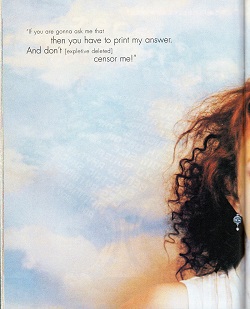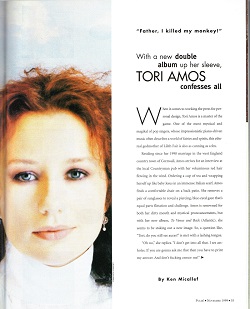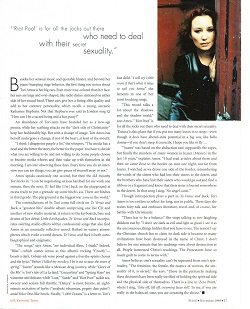|

songs | interviews | photos | tours | boots | press releases | timeline
Pulse (US)
(Tower Records free magazine)
November 1999
With a new double album up her sleeve, Tori Amos confesses all
By Ken Micallef
When it comes to working the press for personal design, Tori Amos is a master of the game. One of the most mystical and magikal of pop singers, whose impressionistic piano-driven music often describes a world of fairies and spirits, this ethereal godmother of Lilith Fair is also as cunning as a fox. [Note – Tori never performed at Lilith Fair].
Residing since her 1998 marriage in the west England country town of Cornwall, Amos arrives for an interview at the local Countryman pub with her voluminous red hair flowing in the wind. Ordering a cup of tea and wrapping herself up like baby Jesus in an immense Italian scarf, Amos finds a comfortable chair on a back patio. She removes a pair of sunglasses to reveal a piercing, blue-eyed gaze that's equal parts flirtation and challenge. Amos is renowned for both her dirty mouth and mystical pronouncements, but with her new album, To Venus and Back (Atlantic), she seems to be staking out a new image. So, a question like, "Tori, do you still see auras?" is met with a lashing tongue.
"Oh no," she replies. "I don't get into all that. I see assholes. If you are gonna ask me that then you have to print my answer. And don't fucking censor me!"
Besides her sensual music and quotable bluster, and beyond her piano-humping stage behavior, the first thing you notice about Tori Amos is her big ears. Even more rosy-colored than her face, her ears are large and oval-shaped, like radio dishes stationed on either side of her round head. These ears give her a fitting elfin quality and add to her contrary personality, which recalls a young, sarcastic Katharine Hepburn. Not that Hepburn ever said in London mag Q, "How can I be a sacred being and a hot pussy?"
An abundance of Tori-isms have branded her as a new-age poseur, while her scathing attacks on the "dark side of Christianity" keep her fashionably hip. But with a change of image, Tori Amos has herself undergone a change, if not of the heart, at least of the mouth.
"I think I disappoint people a lot," she whispers. "The media has a need and the better the story, the better for the paper. You have to decide what you are willing to do and not willing to do. Some people choose to become media whores and then wake up with themselves in the morning. I am into observing these days. Every time you do an interview you can say things, you can give pieces of yourself away or not."
Amos speaks cautiously one second, but then the old mouthy Tori kicks in: "I can be negotiating serious hardball for my work one minute, then the next, [I] feel like [I'm] back on the playground at recess ready to put a grenade up some bitch's ass. There are bitches in third grade. The playground is the biggest war zone in the world."
The contradictions of St. Tori come full circle on To Venus and Back, a "greatest hits" double album comprising one live CD and another of new studio material. A return to the keyboards, bass and drums of her debut Little Earthquakes, To Venus and Back incorporates swirling studio effects within confessional songs that also find Amos in an unusually reflective mood. Bathed in watery atmospheres which evoke a torrid dream, To Venus and Back is both autobiographical and enigmatic.
"The songs," says Amos, "are individual films, I think." Indeed, "Bliss" - which comes across as this album's rocking "Crucify" - boasts a dark, Cobain-ish verse posed against a free-the-spirits chorus and the lyrics "Father, I killed my monkey, I let it out to taste the sweet of spring." "Juarez" sounds like a Mexican drug journey, while "Glory of the 80s" is Tori's tale of La La land. "Concertina" and "Spring Haze" are winsome and delicate, while "Lust," "Suede" and "Riot Poof" tackle sex, sorcery and sexism full throttle. "Datura" is most bizarre, an eight-minute recitation of herbs ("awabuki viburnum, pygmy date palm") amid Yoko Ono-like howls. Finally, "1,000 Oceans" is a letter to Tori's lost child. "I will cry 1,000 more if that's what it takes to sail you home," she laments in one of her most touching songs.
"This record talks a lot about the shadows and the shadow world," says Amos. "'Riot Poof' is for all the jocks out there who need to deal with their secret sexuality. 'Datura' is this plant that if you put too many leaves in to steep - even though it does have altered-state potential in a big way, like belladonna - if you don't steep it correctly, I hope you like to fly...
"'Juarez' was based on the abduction and supposedly the rapes, but finally the murders, of many women in Juarez [Mexico] in the last 10 years," explains Amos. "I had read articles about them and then we came close to the border on tour one night, not far from Juarez. I watched as we drove one side of the border, remembering the words of the sisters who had lost their sisters to the desert, and the brothers who have lost their sisters who would go out and find a ribbon or a fragment and know that their sister is buried somewhere in the desert. In that song I sing, 'No angel came.'"
Though introspection plays a part in To Venus and Back, Tori Amos is too restless to reflect for long, nor in public. These days she resists fairy talk and embraces literature, travel and, of course, her battles with Christianity.
"There has to be a balance." She stops talking as two laughing children run by. "I don't see dark as evil and light as good. I see it as the unconscious, things hidden that you have to see. The reason I say the Christian church has to claim its dark side is because so many civilizations have been destroyed in the name of Christ. I don't believe for one minute that his teachings were about destruction at all. People harnessed Christ's teachings. The Protestants have so much guilt to come to terms with."
Amos believes one's sexuality can't be separated from one's spirituality. "The feminine, the female, the essence of woman, the sensuality of it, is sacred," she says. "Those in the patriarchy making these decisions have been really terrified of holding the spiritual side and the physical side of themselves. There is a line in 'Zero Point,' where I sing, 'Take off, lift off, creaming Jesus still.' To me, if you are really in the balanced state, you are creaming the divine."
original article
 

[scans by Sakre Heinze]
t o r i p h o r i a
tori amos digital archive
yessaid.com
|